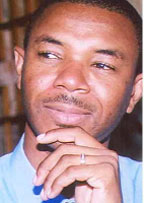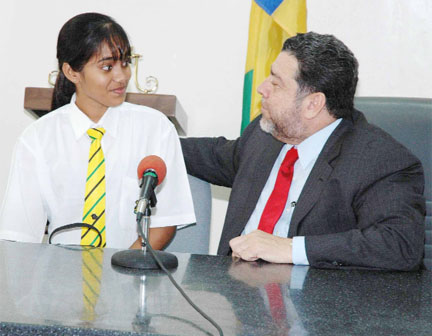2009 marks the 30th year since the Caribbean Examinations Council offered the first ever indigenous examination to students in the region.

CXC Assistant Registrar-Public Information, Cleveland Sam has agreed to produce a series of articles on the origins and significance of the CXC for the Guyana Review.
In this issue we publish the first article in that series.
Part 1
The year 1979 was a turbulent one for the Caribbean region in general and the world in particular. It was the year Maurice Bishop carried out a bloodless coup in Grenada; there was the Union Island uprising in St Vincent and the Grenadines; the La Soufriere Volcano erupted in St Vincent and the Soviet Union invaded Afghanistan.
But 1979 is perhaps one of the most significant years in the history of regional education development. It was during May/June 1979 that for the first time Caribbean secondary school students wrote an examination prepared by Caribbean people, for Caribbean people and marked and graded by Caribbean people!
Thirty thousand, two hundred and seventy-six (30, 276) candidates from the region were part of this historic occasion as they wrote the first sitting of the Caribbean Secondary Education Certificate, CSEC, commonly called CXCs.
Though the operation experienced some challenges, it signaled the entry of the Caribbean Examinations Council (CXC) into the global examination landscape, and more importantly the beginning of the region’s break from the UK examination boards. It was a proud moment in Caribbean history.

For this first sitting, the Council offered five subjects for the CSEC; four at the General and Basic Proficiencies and one at General Proficiency only. The five subjects were English Language, Geography, Caribbean History and Mathematics at General and Basic and Integrated Science was offered as a pilot at General only. Fifty-eight thousand, seven hundred and eight (58,708) subject entries were received. The breakdown by subject was:
● English Basic – 14747
● English General – 12056
● Geography Basic – 4866
● Geography General – 5409
● History Basic – 942
● History General – 1571
● Mathematics Basic – 12844
● Mathematics General – 5822
● Integrated Science – 451
Thirteen of the then 14 Participating Territories submitted entries for those examinations. The registration process was far from smooth. “A number of entries were submitted long after the closing date for registration,” wrote then CXC Registrar Wilfred Beckles in his Report to Council. “The reasons for the late entries were understandable, but the dislocation in the schedules inevitably increased pressure on the Registry to complete each phase on time and affected the entire process.”
There was good news with respect to the shipping and clearance of the scripts at the various ports of entries. This was as a result of discussions the Council held with airlines, customs and airport authorities in the Participating Territories.
Beckles reported, “CXC materials were handled with expedition and the Registry was able to ship materials to Local Registrars in good time for the administration and have the scripts returned to Headquarters and Western Zone Office for the marking exercise to begin on schedule…”
The marking was conducted in Barbados and Jamaica, the two territories in which the Council has offices. English and Integrated Science were marked in Jamaica and Mathematics, History and Geography were marked in Barbados.
Some three hundred and thirty-seven (337) markers participated in the exercise. They were selected from all the Participating Territories and marked for a two-week period starting on July 16. However, a lot of preparations went into getting the process to that stage.
Members of CXC staff went on study visits to examinations boards in Scotland and England.
Then Assistant Registrar, later Senior Assistant Registrar for Examinations Administration, Baldwin Hercules, benefited from such visits. “I was privileged to go to the major examination boards in the UK, Cambridge, London and the Joint Matricu-lation Board (JMB) in Manchester to observe the practices,” he said. “In fact, that certainly helped me to perform the duties in the Examination Division. We borrowed a lot of their best practices,” Hercules pointed out.
Elma Licorish, one of the Council’s first employees also recalled visiting examination boards in Scotland and England, including Cambridge. “Cambridge provided assistance to ensure that the standard of the examinations the Council was offering was maintained,” she stated.
In addition to the study visits, training was a significant aspect of the Council’s work prior to the 1979 examinations.
“We had a lot of training courses in Guyana, Trinidad and Barbados,” she said. “People applied to be markers and we trained them.” Additionally, consultants from overseas examination boards visited CXC to train staff and resource persons.
“Those were very exciting times,” quipped Mr Hercules. “We were determined to make it happen because there were a lot of people on the outside who doubted that we could do it and they were very sceptical.”
Scepticism aside, the team at CXC pressed and delivered the first examinations.
The marking exercise was not as smooth as the examination administration.
“I remember we did the first marking at Windsor Hotel (Barbados) and I was in charge of Maths Basic,” Bernadine Parris recalled. “The first morning we went there like pigeons without heads,” Mrs Parris joked. It took them some time before they figured out the routing of the scripts and this caused a back up of scripts she recalled.

“ We were told to route these scripts to these tables, you would know to yourself that you had to get a finished folder or get the scripts marked fast, so you had to design a pattern for routing, and we got it done.”
Ms Licorish said they underestimated the number of people needed to complete the operation. “At first they had been marking at Windsor Hotel and they had envisaged having a couple people up there grading these mark sheets but it didn’t work… “It was a Sunday morning when we had to gather everybody who could see and hold a pencil to come and set up this operation and then they were shipped to Examination Testing Service (ETS) in New Jersey, USA.
For Ms Licorish, the ETS story is one she will not forget! The Council had not yet established an examination processing system and an arranged was made with ETS to process the results for CXC. She was charged with going to ETS and bringing back the results. When ETS was finished the processing of the results Ms Licorish had 29 boxes to contend with. “Twenty-nine boxes of it!” she exclaimed.
“The plane had been delayed and I got a lot of hassle from BWIA staff at JFK Airport about why I was carrying so many boxes,” she said as she recounted the experience. She explained to the staff that the boxes contained CXC examination results, but nobody knew of CXC at that time.
However, Ms Licorish and the boxes were eventually allowed on the flight. But the greatest drama with the results was yet to come.
“The way ETS had packed the results, they were all jumbled up,” she stated with a sigh. “I have vivid memories of people like Prunella King (former staff member) sitting down on the floor in the vault at 2:00 am trying to sort out these things,” she continued.
The cause of the mix up? Think 1979, 30 years ago; there were no fax, no e-mail and certainly no Internet facilities, far less cell phones. In those days cables were used to communicate changes to ETS. As it turned out, the final set of changes which CXC sent never reached ETS. “I had to check every one of them manually,” Ms Licorish said.
And if you thought no fax and e-mail sound stone-age, there were no computers either, only typewriters and gestetiner machines. The provisional certificates had to be typewritten and that task also fell on Ms Licorish. With a good laugh, she also remembered that the date was left off the certificates and a rubber stamp was used to put it on.
“It is amazing now to see everything is computerised,” remarked Mrs Parris. “You can just press buttons and get things out, but I remember the days when I use to do the examiners’ tickets with my hand. I use to write all those names (markers) for tickets by hand.”
E-tickets were light years away.
Archaic technology aside, “we came through; the results were late, but they came out nevertheless,” Mr Hercules said. The results were issued on September 15 that year, one week behind the scheduled date. These days results are issued a month ahead of this 1979 date.
The students who took those first examinations in 1979 are the managers of companies today, your doctors, principals of schools, Ministers of Government, lecturers at universities, lawyers, leaders of nations and are making their mark not just in the region, but around the world.
Honouring the Class of ‘79
To celebrate the milestone CXC will be honouring the Class of ’79 in July this year during the marking exercise. The Class of ’79 includes all the staff who worked on the 1979 examination; the members of the five subject panels; members of the five subject examining committees; members of the Final Awards Committee and markers who marked then and are still marking in 2009. The awards ceremonies will be held in Barbados and Jamaica.
CXC will also be featuring 30 in 30 years- a look at 30 persons from across the region who, through their contribution to CXC has significantly influenced the development of CSEC in its 30-year history. These persons will be profiled in CXC’s Caribbean Examiner magazine and on www.cxc.org throughout the year.
Each ministry of education will also be publishing a newspaper supplement in June to commemorate the historic milestone.
Guyana has most CSEC Top Awards
Guyana has had a long and distinguished history of excelling at CSEC. Since the introduction of the Regional Top Awards programme in 1988, Guyana has led the region with the most Regional Top Awardees overall. Students from the country have copped the award six times, starting in 1997 with Mohalani Chatterdeo of Queen’s College. This is more than any other country; Grenada and St Lucia with four Top Awardees each come the closest to Guyana.
All Guyana’s Top Awardees came from Queen’s College. The others are; Amiata Persaud, 1999; Daniel Ram, 2003; Shervanie Persaud, 2006; Wainella Isaacs, 2007; and Yana-Marisa Edwards, 2008.
Apart from winning the overall top CSEC prize, dozens of Guyanese students have also won subject awards, the latest were Rahual Lall of Anna Regina Secondary School for Technical/Vocational Education; Suraj Mattai and Aaron Haralsingh both of Queen’s College for Business Education and Natural Sciences respectively.
Moving Forward
Over the last 30 years, CSEC has seen major improvements and increases in all aspects of the examination. Candidates entries have grown from just over 30, 000 candidates in 1979 to almost 150, 000 now; subjects entries increased from 58 000 in 1979 to over half a million today.
From offering only five subjects in 1979, CXC now offers 33 CSEC subjects.
Critical to any examination board is the acceptance of CSEC by universities in the region and abroad. Caribbean students get into universities with their CSEC qualifications and many schools do not require them to take SAT or any other entrance test, except for scholarship or advanced placement purposes.
The Council’s new Strategic Visions calls for the review of all its examinations and “ the recognition of the utility of CXC examinations in relation to knowledge and competence certification as well as applicability to the world of work.”





